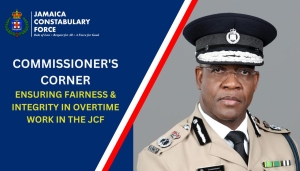
In the evolving landscape of modern policing, ensuring fair and transparent compensation for overtime work is both a logistical necessity and a moral imperative. Police Commissioner Dr Kevin Blake’s most recent commentary in ‘Commissioner’s Corner’ addresses the critical issues surrounding the Workforce Management System (WMS) and overtime payments in the Jamaica Constabulary Force (JCF). His insights offer a glimpse into the strides being made towards establishing a robust, fair, and transparent system for compensating police for their hard work.
Addressing Controversy Head-On
The introduction of the WMS has not been without its challenges. Commissioner Blake openly addresses the controversy that has surrounded the system, debunking myths and affirming the High Command’s commitment to fair compensation. He emphatically states, “Attempts have been made to use this very important issue to drive a wedge between the Rank and File and the Officer Corp. Just the ridiculousness of the idea that the High Command is against persons being paid overtime is baffling.” This clear rejection of divisive rhetoric highlights his commitment to unity and fairness within the force.
Blake further clarifies, “Let me be absolutely clear, this High Command is in total support of members being duly compensated for work done. The very nature of the job you do demands that. However, we must also be very careful in ensuring that the integrity of the system is not compromised.” This dual emphasis on fairness and integrity is instructive. It reassures JCF members that their hard work will be recognized and compensated, while also upholding the system’s credibility.
Understanding the Workforce Management System
Commissioner Blake provides a detailed explanation of how the WMS operates, distinguishing between scheduled and unscheduled overtime. He explains, “There are two ways in which overtime work can be done, namely scheduled and unscheduled. Scheduled overtime occurs when the duty to be carried out, relative to the number of persons to carry out the duty requires members to work beyond the 40 hours.” This clarification is essential for understanding the practical application of the WMS.
He further elaborates, “Unscheduled overtime, on the other hand, occurs when an unexpected situation arises that requires a member to go beyond their usual scheduled hours of work for a given period of time. In these circumstances, the overtime must be authorized by a supervisor and approved by a member of the Command Team.” This structure ensures accountability and provides a clear protocol for compensating unscheduled overtime, reinforcing the system’s integrity and transparency.
Clarifying Overtime Calculations
One of the significant sources of confusion has been how overtime is calculated. Blake addresses this head-on: “Overtime is calculated against a week’s work, and not for each day. What that means is that, working ten hours instead of the scheduled eight hours in a given day, does not represent two hours of overtime. Instead, it represents two hours of extra time.” This explanation is vital for clearing up misunderstandings and ensuring that claims are accurate and fair.
He continues, “At the end of the week, the total time worked for that week is what is used to determine the number of overtime hours.” By emphasizing the weekly calculation, Blake aligns the system with standard labour practices, ensuring that overtime is calculated consistently and fairly across the board.
Tackling Issues and Making Improvements
Acknowledging the initial issues with the WMS, Blake is transparent about the challenges faced and the improvements made. He notes, “In reviewing a number of the complaints of non-, and sometimes part payments, it was discovered that there was a bit of confusion as to what persons should be paid for. Members were expecting payments for hours scheduled, as opposed to hours worked.” This admission of early missteps is a testament to the ongoing efforts to refine the system and ensure it meets the needs of all officers.
He further highlights, “Incorrect and missing data…this has been significantly improved and far less rejects are resulting from the attempt at ingesting the data into the system.” This focus on continuous improvement showcases the commitment to making the WMS a reliable and accurate tool for managing overtime.
Appreciation and Encouragement
Despite the controversies and challenges, Commissioner Blake expresses deep appreciation for the team behind the WMS. “I want to place on record my deepest appreciation for the team who have worked tirelessly for several months leading up to the roll out of the WMS, and who have continued to provide exemplary support in seeing to its success.” This acknowledgment underscores the hard work and dedication of those involved in implementing the system.
Blake’s concluding remarks resonate with unity and mutual support: “Be assured that I view your challenges as our challenges and your success as our success. At the end of the day, we are the ones who are in this thing together, so let no one put asunder.” This statement encapsulates his commitment to leading a cohesive, supportive, and fair police force.
Commissioner Blake’s commentary on the WMS and overtime payments reflects a thoughtful and progressive approach to modern policing. By addressing controversies, clarifying processes, and emphasizing continuous improvement and integrity, he sets a standard for fair and transparent compensation practices. This commitment not only enhances trust within the force but also sets a benchmark for accountability and excellence in law enforcement. As the JCF continues to evolve, these principles will be crucial in fostering a culture of fairness, unity, and professional integrity.
Read more of the Commissioner’s Corner
















